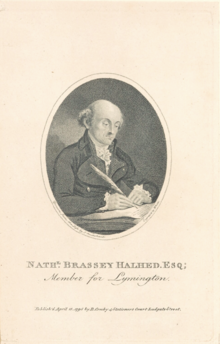Nathaniel Brassey Halhed | |
|---|---|
 | |
| Born | 25 May 1751 |
| Died | 18 February 1830 |
| Occupation(s) | Orientalist and philologist |
| Spouse | Louisa Ribaut |
Nathaniel Brassey Halhed (25 May 1751 – 18 February 1830) (Bengali: হালেদ, romanized: "Haled") was an English Orientalist and philologist.[1]
Halhed was born at Westminster, and was educated at Harrow School, where he began a close friendship with Richard Brinsley Sheridan. While at Oxford he undertook oriental studies under the influence of William Jones. Accepting a writership in the service of the East India Company, he went out to India, and there, at the suggestion of Warren Hastings, translated the Hindu legal code from a Persian version of the original Sanskrit. This translation was published in 1776 as A Code of Gentoo Laws. In 1778 he published A Grammar of the Bengal Language, a Bengali grammar, to print which he set up the first Bengali press in India.[2]
In 1785 Halhed returned to England, and from 1790 to 1795 was member of parliament for Lymington, Hants. For some time he was a disciple of Richard Brothers, and a speech in parliament in defence of Brothers made it impossible for him to remain in the House of Commons, from which he resigned in 1795. He subsequently obtained a home appointment under the East India Company. He died in London on 18 February 1830.[2]
- ^ "Halhed, Nathaniel Brasssey". Biographical Dictionary of the Living Authors of Great Britain and Ireland. Printed for H. Colburn. 1816. p. 142.
- ^ a b Chisholm, Hugh, ed. (1911). . Encyclopædia Britannica. Vol. 12 (11th ed.). Cambridge University Press.